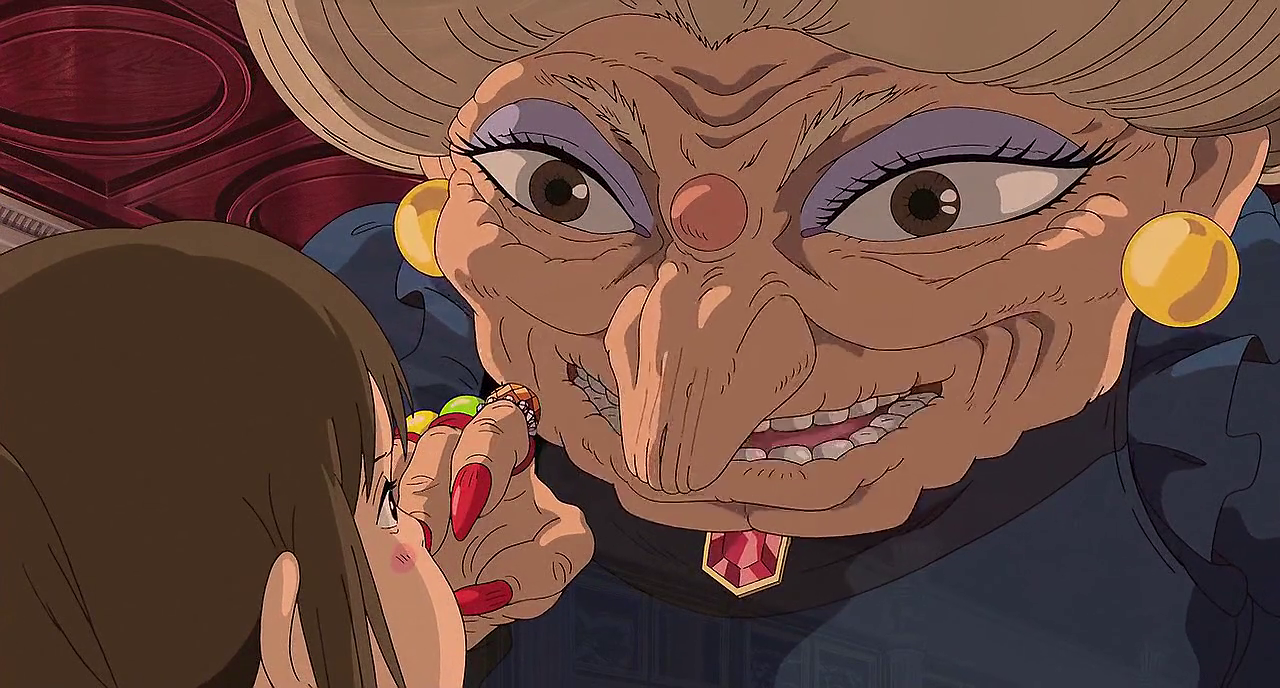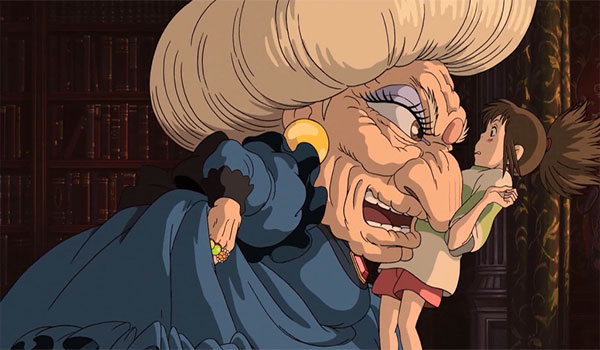So your name’s Chihiro? What a pretty name…and it belongs to me now.
– Yubaba (Spirited Away)
In the west, we’ve largely destroyed the art of naming children. Parents scramble to discover a name that’s unique (but maybe not too unique), memorable, beautiful, and timeless, but in searching for an aesthetically pleasing name, most will forget something perhaps far more important – the meaning of their child’s name. In other parts of the world, including Japan, these meanings are more expressed and significant, adding a layer of beauty to naming that’s lacking here. Maybe this’s why in anime we often see a focus on characters’ names – not just what on they mean, but also in plot lines revolving around such.
In Spirited Away, Chihiro, our heroine, signs away her name; from henceforth, she’s known in the bathhouse as Sen. As soon as she becomes “Sen,” Chihiro comes under a spell that threatens to make her forget everything she’s known; the connection to her name is vital in helping her remember. Yubaba knows this, which is why she takes the name from her (and earlier, from Haku).
The Japanese know well the power in names. In an effort to assimilate Koreans under it’s banner, the Japanese government enforced a variety of decrees, one of which was soshi-kaimei, pressuring Koreans to take Japanese names. This policy deeply affected Koreans*:
For generations, a destitute Korean father above the slave caste had at least been able to bestow his name on his child. Now even that was taken away. Many Koreans submitted their new names for registration wearing black armbands and went afterwards to pray at their ancestral tombs. Parents begged their bewildered children to forgive them, and a new generation of nationalists discovered themselves in the crucible of their parents’ misery.
Modern anime continues to emphasize how integral names are to our identities. I once described the significance of names in a series we think very highly of here on Beneath the Tangles, Haibane Renmei:
The haibane are given them as they are born into their new world. These names reflect their dreams – it is a significant part of their identities. The main characters have the names of Rakka (falling) and Reki (pebble). As time passes, the mysterious beings known as the haibane renmei can present the haibane with new names, reflecting their growth or failure to grow past obstacles that seem fated to them.
The highly emotional conclusion of the series revolves around the Rakka’s and Reki’s name, which each prove to be both telling and life-changing.
In Noragami, which has returned for another season this fall, Shinto gods and goddesses are armed through regalia, spirits who are given names by the gods who oversee them. The regalias’ names tie them to their masters and give them an identity. On the other hand, “nora” are those that have multiple names and are looked down upon by the spirit community – they devalue the importance of names, which thus devalues the importance of relationship.

I wonder, also, if many the gods and goddesses of Noragami look down upon nora because they cannot control them; the nora have shown time and time again that they have no true master – they wander away and serve whomever they choose. Control, as with the Japanese during Korean occupation, is inextricably connected to naming:
To take a name away from a person is an attempt to keep them under perfect control.
– Hayao Miyazaki (The Art of Miyazaki’s Spirited Away)
Yubaba’s control over Chihiro disappears when she is able to beat the witch at a guessing game, at which time her name is restored. Earlier, in a more striking scene, Haku is freed from Yubaba as well once Chihiro helps him to remember his name.
The control these supernatural beings have over their human (or spirit) counterparts may lead us to dwell on whether God wants the same of us. We do find identity in Christ, taking on his characteristics as we are transformed after salvation; still, our “names” remain the same. And perhaps this is tied into how God approaches us, in a manner that isn’t controlling, but is rather freeing:
To him the doorkeeper opens, and the sheep hear his voice, and he calls his own sheep by name and leads them out.
– John 10:13 (ESV)
In the parable of the good shepherd, Christ compares himself to one who cares for his sheep. He leads them to safety and puts himself in harm’s way to protect them. Why? Because he cares for them. He knows all his sheep by name, indicating the care and personal relationship He has with them.
Our names are a unique part of our identity. They help mark us and make us who we are. And God cares about each of us deeply – our individual thoughts and concerns, the things that make you you. And in doing so, he gives up control – as he did when wrestling with Jacob and letting him win (and then giving him a new name, Israel).
God doesn’t overcome us with the power of enslavement. Instead, he gives us the choice to submit to the King as a response to who he is, to the love and power and majesty that characterizes God.
And we find something strange happens when we surrender – that in our allegiance we don’t lose freedom but gain it, a loosening from the sin that shackles us down. We become Christ’s, individuals who in freedom have surrendered and now take on the moniker of “child of God” in addition to our own names. We are now indeed the beloved of Christ – those he has called by name.
—
*The linked article mentions “Lost Names: Scenes from a Korean Boyhood” by Richard E. Kim. It’s a wonderful work, and I highly recommend you read it if you’re interested in soshi-kaimei.



Interesting article. I think to a lesser, or at least different extent, American society at least has understood the significance of names enough to severely encourage name modification or total change and in some instances basically forced it. Even today, there are people with unique names that actually do have deep ties to the languages/cultures of their ancestors’ heritage and they get written off as made-up, arbitrary, or meaningless. It’s almost as if the naming-without-meaning that you mention is trying to impose itself upon those that actually understand names as a way of preserving culture.
That is a really interesting way at looking at the process of naming. I think you might be right there, Taylor…
An interesting characteristic of many old cultures is that they never use the name of any being they either respect or do not want to attract the attention of. A good example of this is the Hebrew tendency to omit God’s name entirely, instead referring to him as “Our Lord”, and old Irish and Gaelic peoples calling the arguably demon-esque creatures they saw “Fair Folk.” Not to mention, pretty much all of the names for Satan (Including that one, which means “prosecutor” or “accuser” basically) in every culture are descriptions rather than his actual name. So all of this at least indicates that most ancient people felt like names had power, and invoking someone’s name was a sort of magic. It drew their attention. God seems to think so too, because He often renames people who change natures.
Granted, I once tried this experiment which showed that if you referred to anything long enough with even a ridiculous name (Lampshade in that case), it would slowly start to FEEL like it was that person’s name. There’s no evidence in the modern world that a name can give anyone power over anyone else, but it’s still very interesting to see how the ancient naming superstitions could relate to Christianity.
Thank you, as always, for adding your voice to the conversation. Although entirely less serious in nature, your input made me think of a certain character “who shall not be named” and how the title character boldly says it, and by doing so takes away the fear associated with his name.
Beautiful message! I have a lot of siblings, and one of the things I love about being the oldest, was being able to watch the process of my parents naming my siblings. They put so much thought into what kind of people they wanted us to be, and it reflects in our names. As a writer, I always name my characters something to do with their personality, or something that foreshadows events in the story. Names are their own kind of art, and they can be more beautiful then just their sound if your willing to treat them with respect, something I don’t think is very valued in the western world anymore. A while back, my theatre troupe preformed “the Crucible”. What I loved about that show was one specific character having to choose between loosing his family name (so that his sons would no longer be able to pass down their name to other generations) or being killed for crimes he did not do. Watching this character’s turmoil as he made his decision was powerful and moving.
Thanks for the input! The power of names…there’s just so much we could write about this topic, and so much to be said!
[…] Photo Credit: https://beneaththetangles.com/2015/11/05/sen-to-chihiro-control-to-freedom-the-significance-of-names… […]